
Maurice Ernest Gibb was a British musician, songwriter and singer. He achieved worldwide fame as a member of the pop group Bee Gees. Although his elder brother Barry Gibb and fraternal twin brother Robin Gibb were the group's main lead singers, most of their albums included at least one or two songs featuring Maurice's lead vocals, including "Lay It on Me", "Country Woman" and "On Time". The Bee Gees are one of the most successful pop-rock groups of all time.

Cucumber Castle is the seventh studio album by the Bee Gees, released in April 1970. It was produced by Barry Gibb, Maurice Gibb, and Robert Stigwood. It consists of songs from their television special of the same name, which was named after a song on their 1967 album Bee Gees' 1st. Cucumber Castle is the only Bee Gees album not to feature any recorded contributions from Robin Gibb, as he had left the group before the album was recorded.
"I Still Love You" is a song by the Bee Gees primarily written by Barry, Robin & Maurice Gibb. It was released as a double A side of "Living Eyes" and on the album Living Eyes. Produced by the Gibb brothers with Albhy Galuten and Karl Richardson.

Horizontal is the fourth studio album by the Bee Gees, and their second album to receive an international release. The LP was released in early 1968, and included the international hit singles "Massachusetts" and "World". On 5 February 2007, Reprise Records reissued Horizontal with both stereo and mono mixes on one disc and a bonus disc of unreleased songs, non-album tracks, and alternate takes. The album was released in Polydor in many countries and on Atco only in the US and Canada. "And the Sun Will Shine" was released as a single only in France. The influences displayed on the album range from the Beatles to baroque pop.

The Bee Gees Sing and Play 14 Barry Gibb Songs is the debut studio album by the Bee Gees. Credited to Barry Gibb and the Bee Gees, it was released in November 1965 on the Australian Leedon label. It is largely a compilation of most of the Gibb brothers' singles that had been released over the previous three years in Australia, which accounts for the many different styles of music on it.
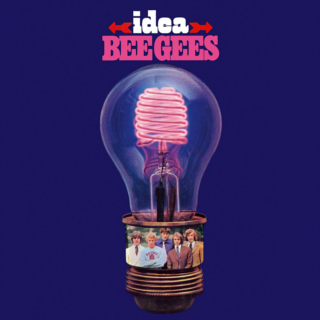
Idea is the fifth album by the Bee Gees. Released in September 1968, the album sold over a million copies worldwide. The album was issued in both mono and stereo pressings in the UK. The artwork on the Polydor release designed by Wolfgang Heilemann featured a "beehive" neon lightbulb with a group photo in its base, while the North American ATCO release designed by Klaus Voormann featured a composite head made from each band member. It was their third internationally released album – the first two albums being released only in the Australian market.
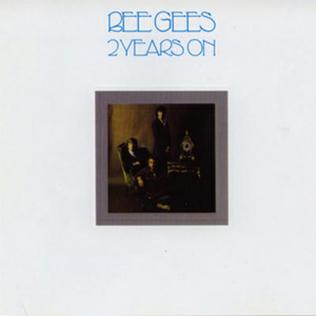
2 Years On is the eighth studio album by the Bee Gees, which reached No. 32 on the US charts. Released in 1970, the album saw the return of Robin Gibb to the group after an earlier disagreement and subsequent split following Odessa. 2 Years On was the first album with drummer Geoff Bridgford, who remained a full-time member of the group until 1972 although he was not pictured on the sleeve. The best-known track is "Lonely Days". Released as the first single by the reunited brothers, it charted high in the US, but peaked at No. 33 in the United Kingdom.

To Whom It May Concern is the tenth album by the Bee Gees. Released in October 1972, it is the follow-up to, and continues the melancholic and personal sound of its predecessor, Trafalgar. The album was recognised as "a farewell to the old Bee Gees" as the album marked the end of an era for the group in several ways: it was their last album to be recorded solely at IBC Studios, in London, their last with conductor and arranger Bill Shepherd, who had guided them since 1967, and their last under their first contract with Robert Stigwood. Some of the songs were old ones finished or rewritten for the occasion.
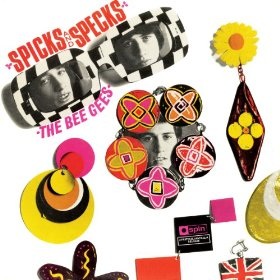
Spicks and Specks is the second studio album by the Bee Gees. It was released in November 1966, on Spin. Primarily written by Barry Gibb, the album includes the first Robin Gibb composition "I Don't Know Why I Bother With Myself" and a Maurice Gibb composition "Where Are You".
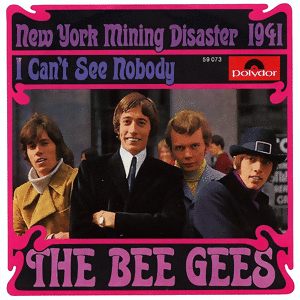
"New York Mining Disaster 1941" is the debut American single by the Bee Gees, released on 14 April 1967. It was written by Barry and Robin Gibb. Aside from a moderately successful reissue of their Australian single "Spicks and Specks," it was the first single release of the group's international career and their first song to hit the charts in both the UK and the US. It was produced by Ossie Byrne with their manager Robert Stigwood as executive producer. The song was the first track of side two on the group's international debut album, Bee Gees' 1st. This was the first single with Australian drummer Colin Petersen as an official member of the band.

Here at Last... Bee Gees... Live is the first live album by the Bee Gees. It was recorded on December 20, 1976 at the LA Forum and was released in May 1977 by RSO Records. It reached No. 8 in the US, No. 8 in Australia, No. 1 in New Zealand, and No. 2 in Spain.

"Peace of Mind" is a song by the Bee Gees, released in Australia in March 1964 as their third single, backed with "Don't Say Goodbye".

"Run to Me" is a song by the Bee Gees, the lead single from the group's album To Whom It May Concern (1972). The song reached the UK Top 10 and the US Top 20.

"Every Christian Lion Hearted Man Will Show You" is a song written by Barry, Robin & Maurice Gibb released by the Bee Gees in 1967 on their album Bee Gees' 1st. It was released as the B-side to "Holiday" in the US, Australia and Canada.
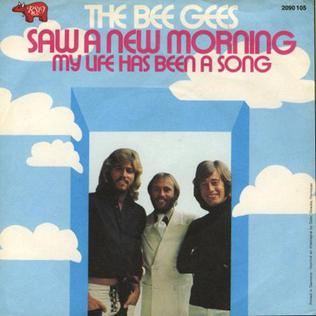
"Saw a New Morning" is the 1973 single released by the Bee Gees. It was also the group's first single released on Robert Stigwood's newly created records label RSO Records. The Bee Gees moved to Los Angeles in 1972 to record the album Life in a Tin Can which was a new direction for the group, who had been recording in England since 1967. The B-side, "My Life Has Been a Song" features lead vocal by Robin Gibb as well as Barry Gibb.
"The Singer Sang His Song" is a song by the Bee Gees, written by Barry, Robin and released in early 1968 as a single along with Jumbo. In some countries the song was the B-side of Jumbo but in others they were promoted as a double A-side.
"Cowman, Milk Your Cow" is a 1967 song by Adam Faith written by the Bee Gees' Barry and Robin Gibb. This song was included on The Two Best Sides of Adam Faith on EMI.
"Follow the Wind" is a song by Barry Gibb and the Bee Gees. Written by Barry Gibb and produced by Bill Shepherd, it was released as the B-side of "Wine and Women" which charted in Australia. It was later included on The Bee Gees Sing and Play 14 Barry Gibb Songs (1965). It was one of the folk rock songs on the album, the others being "I Don't Think It's Funny", "And the Children Laughing" and "I Was a Lover, a Leader of Men".

"Timber!" is a song recorded by the Bee Gees, written by Barry Gibb. The song was released in Australia as their second single in July 1963, backed with "Take Hold of That Star". It was later included on the group's first album The Bee Gees Sing and Play 14 Barry Gibb Songs.
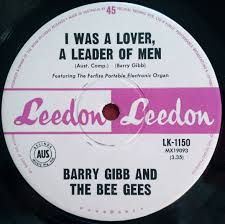
"I Was a Lover, a Leader of Men" is a single released in November 1965, recorded by the Bee Gees, and written by Barry Gibb. In Australia, the B-side was "And the Children Laughing". It is also the first track of the Bee Gees' first album, The Bee Gees Sing and Play 14 Barry Gibb Songs. This song won Barry a songwriting award.
















